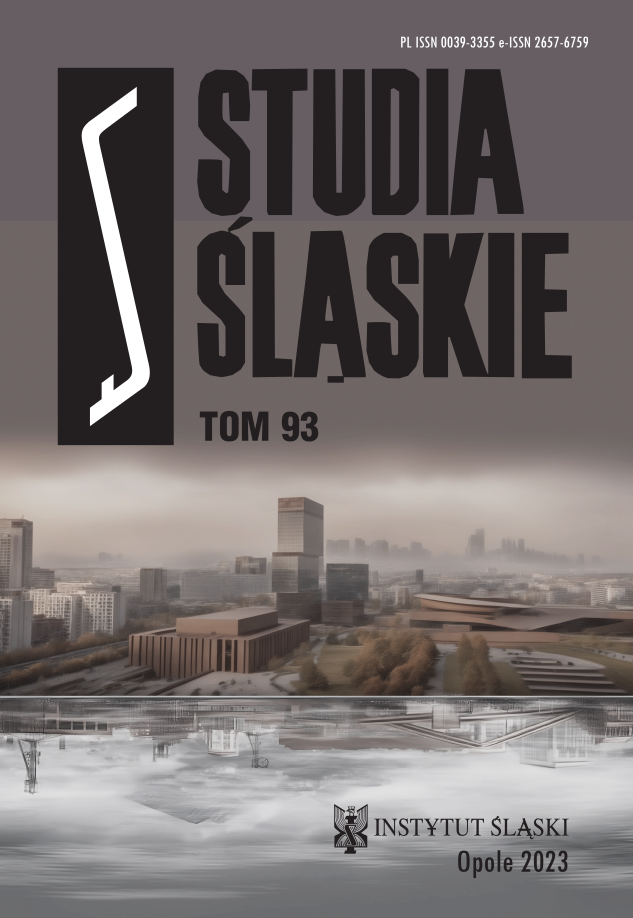Studia Śląskie
Silesian Studies
Publishing House: Instytut Śląski
Subject(s): History, Social Sciences, Economy
Frequency: 2 issues
Print ISSN: 0039-3355
Status: Active
- 2010
- 2011
- 2012
- 2013
- 2014
- 2015
- 2016
- 2017
- 2018
- 2019
- 2020
- 2021
- 2022
- 2023
- 2024
- 2025
- Issue No. 69
- Issue No. 70
- Issue No. 71
- Issue No. 72
- Issue No. 73
- Issue No. 74
- Issue No. 75
- Issue No. 76
- Issue No. 77
- Issue No. 78
- Issue No. 79
- Issue No. 80
- Issue No. 81
- Issue No. 82
- Issue No. 83
- Issue No. 84
- Issue No. 85
- Issue No. 86-87
- Issue No. 88-89
- Issue No. 90
- Issue No. 91
- Issue No. 92
- Issue No. 93
- Issue No. 94
- Issue No. 95
- Issue No. 96
Articles list
{{ article.TitleOriginalLanguage }}
{{ article.TitleOriginalLanguage }}
({{ article.TitleEnglish }})
- Publication: {{ article.Publisher }} ({{ article.Issue }})
- Author(s): {{ article.Authors }}
- Contributor(s): {{ article.Contributors }}
- Language: {{ article.Language }}
- Subject(s): {{ article.Subjects }}
- Issue: {{ article.Issue }}
- Page Range: {{ article.PageRange }}
- No. of Pages: {{ article.NumberOfPages }}
- Keywords: {{ article.Keywords }}
- Summary/Abstract: {{ article.SummaryAbstract }}
- Price: {{ common.currency(article.Price) }}
Short Description
“Silesian Studies,” the most important periodical issued by the Silesian Institute (formerly the Governmental Research Institute – Silesian Institute in Opole and the Silesian Institute Society), is one of the scientific journals of interdisciplinary character present on the Polish publishing market for the longest time. Initially (in the years 1949–1952), individual volumes of the series appeared as special issues of “Przegląd Zachodni” (Western Review). At that time already, “Silesian Studies” were associated with the name of professor Seweryn Wysłouch, who – managing the Wrocław branch of the Western Institute and at the same time the School of the History of Polish State and Law of the Polish University in Wrocław – gathered around himself a circle of young persons who set out the course for the research on the history of Silesia over years. Among his students, there were Karol Jonca, Kazimierz Orzechowski and Franciszek Ryszka. The Wrocław branch of the Western Institute was wound up in 1953, and thereupon studies on Silesia were centralised within the Silesian Research Department of the Polish Academy of Sciences. The idea of issuing a scientific journal devoted to the recent history of political, socio-economic and national problems and the history of political system and law in the 19th and 20th centuries revived in 1957, when professor Wysłouch established the Silesian Institute in Opole, reactivating its periodical “Silesian Studies.” He once more gathered a circle of students around this journal, trying as well to enrich it with other distinguished experts on Silesia. Professor Wysłouch was the managing editor of this journal until his death in 1968. He was succeeded in this post by other distinguished experts on Silesia: professor Józef Kokot, professor Karol Jonca, professor Wiesław Lesiuk and assistant professor Stanisław Senft. Since 1st February 2020, the journal has been managed by dr Bartosz Kuświk. Over the years, “Silesian Studies” appeared with varying frequency, as semi-annual or annual respectively. In 2013, the practice of issuing two volumes per calendar year was restored. In the following year, the practice of focusing each volume around a leading subject was introduced. Nowadays “Silesian Studies” provide venue to historians, political science scholars, sociologists, economists and other researchers who address the most relevant problems concerning Silesia within its historical borders. “Silesian Studies” are also intended to provide a forum where researchers from Poland, Germany, the Czech Republic and other countries can exchange their views upon issues connected with regions, ethnic minorities and the question of nationality in Central Europe. Each volume has a fixed structure consisting of two sections: “Articles” and “Miscellanea and Materials.” Since 2010, a separate column “Reviews” has appeared as well, and it serves for the publication of larger reviews and information about research projects concerning Silesia, as well as about other forms of scientific life.

